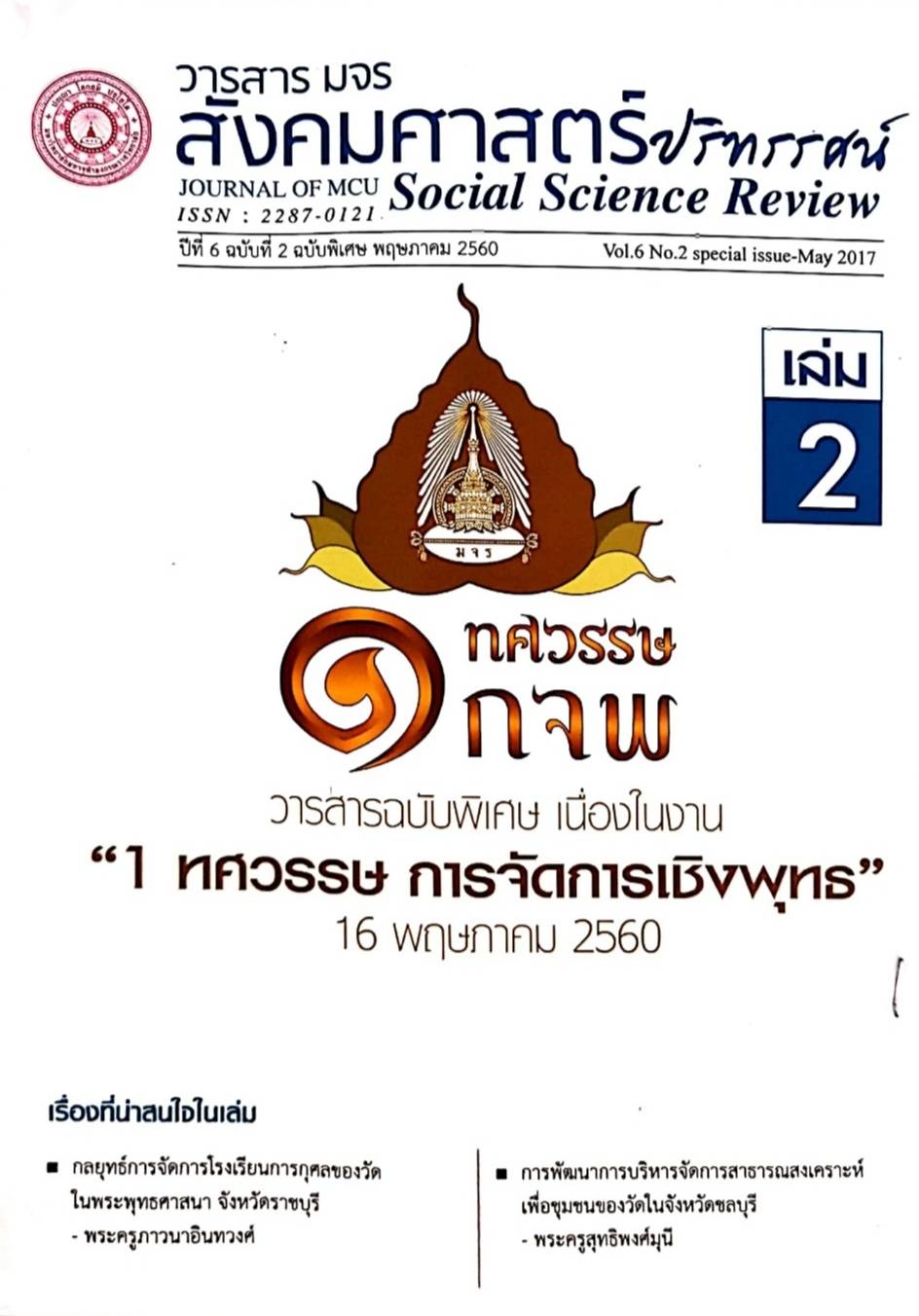วิเคราะห์เรื่องศรัทธาในพระพุทธศาสนาเถรวาท
คำสำคัญ:
พระพุทธศาสนา, ศรัทธา, ปัจจัยภายนอก, ปัจจัยภายในบทคัดย่อ
จากการศึกษา พบว่า ศรัทธาในพระพุทธศาสนา หมายถึง ความเชื่อ ความเลื่อมใสในทางธรรม เชื่อในสิ่งที่ควรเชื่อ เชื่อด้วยเหตุผล เชื่อมั่นในคุณงามความดีตามความเป็นจริง ที่เป็นลักษณะของศรัทธาที่มีขอบเขตของความเชื่อ 4 ประการ คือ (1) เชื่อกฎแห่งกรรม (กัมมสัทธา) (2) เชื่อผลแห่งกรรม (วิปากสัทธา) (3) เชื่อว่าสัตว์ทั้งหลายมีกรรมเป็นของๆ ตัว (กัมมัสสกตาสัทธา) (4) เชื่อปัญญาการตรัสรู้เองโดยชอบของพระผู้มีพระภาคเจ้า (ตถาคตโพธิสัทธา) เพราะว่า ความเชื่อทั้ง 4 ประการนี้ กล่าวโดยสรุปเหลือ 2 ประเภท มี 3 ข้อแรกเป็นความเชื่อในเหตุผลหรือในกฎธรรมชาติเพราะพระพุทธศาสนามองเรื่องกรรมเป็นกฎธรรมชาติ ส่วนข้อที่ 4 เป็นความเชื่อในความสามารถส่วนตัวของผู้เข้าถึงความจริง ดังนั้น ศรัทธาเกิดขึ้นจากเหตุปัจจัยที่สำคัญ 2 ประการคือ (1) ปัจจัยภายนอก หมายถึง ปรโตโฆสะหรือกัลยาณมิตร ที่คอยแนะนำ ชักจูงให้ได้เห็น ได้ฟังสิ่งต่างๆ ที่เกิดขึ้นรอบๆ ตัว แล้วเก็บเอาสิ่งนั้นมาสังเคราะห์ แยกแยะส่วนดีและไม่ดีออกจากกัน (2) ปัจจัยภายใน หมายถึง โยนิโสมนสิการ ที่เป็นกระบวนการคิดอย่างรอบคอบแยกแยะจุดดีจุดด้อยคุณและโทษ เป็นต้น ในด้านความสำคัญ ศรัทธาเป็นกระบวนการเบื้องต้นในการพัฒนาปัญญาเพราะเป็นตัวเร้าให้เกิดความมั่นใจ โดยความเชื่อด้วยเหตุผล และความเป็นจริง มีคุณค่าควรแก่การที่ตนจะดำเนินไปให้ถึง เป็นที่มาของความรู้สูงสุด เข้าถึงวิริยะ (ความเพียร) ชักนำให้เกิดความพยายามทดลองปฏิบัติ ให้เห็นผลประจักษ์ ซึ่งนำไปสู่โลกุตตรปัญญาอันเป็นเป้าหมายสูงสุดและเป็นการหมดภาระของศรัทธาไปโดยสิ้นเชิง หลักศรัทธาที่จะทำให้ไปสู่จุดหมายเช่นนี้ได้ ต้องเป็นศรัทธาญาณสัมปยุต คือ เป็นศรัทธาที่ประกอบด้วยปัญญา และศรัทธาญาณสัมปยุตนี้เท่านั้น ที่ทำเกิดประโยชน์สูงสุดได้จริงตามความหมายของพระพุทธศาสนานั่นเอง
เอกสารอ้างอิง
พระธรรมปิฏก (ป.อ.ปยุตฺโต). (2548). พุทธธรรม ฉบับปรับปรุงและขยายความ. พิมพ์ครั้งที่ 12.กรุงเทพมหานคร: สำนักพิมพ์ศยาม.
พระธรรมธีรราชมหามุนี (โชดก ญาณสิทธิเถระ ป.ธ.9). (2548). หลักปฏิบัติสมถะและวิปัสสนากรรมฐาน. พิมพ์ครั้งที่ 6. กรุงเทพมหานคร: โรงพิมพ์ บริษัท สหธรรมิก จำกัด.
พระสัทธัมมโชติกะ ธัมมาจริยะ. (2556). ปรมัตถโชติกะ (ปริเฉทที่ 1-2-6). กรุงเทพมหานคร: หจก.ทิพยวิสุทธิ์.
มูลนิธิมหามกุฏราชวิทยาลัย.(2535). อภิธานปฺปทีปิกา และอภิธานปฺปทีปิกาสูจิ. กรุงเทพมหานคร:โรงพิมพ์มหามกุฏราชวิทยาลัย.
มหาจุฬาลงกรณราชวิทยาลัย. (2534). พระไตรปิฎกภาษาบาลี. ฉบับมหาจุฬาเตปิฏกํ. 2500.กรุงเทพมหานคร: โรงพิมพ์มหาจุฬาลงกรณราชวิทยาลัย.
มหามกุฏราชวิทยาลัย. (2536). พระไตรปิฎกและอรรถกถาแปล. ฉบับมหามกุฏราชวิทยาลัย.พิมพ์ครั้งที่ 3. กรุงเทพมหานคร: โรงพิมพ์มหามกุฏราชวิทยาลัย.
ราชบัณฑิตยสถาน. (2546).พจนานุกรม ฉบับราชบัณฑิตยสถาน พ.ศ. 2542. กรุงเทพมหานคร:นานมีบุคส์พับลิเคชั่นส์.
ดาวน์โหลด
เผยแพร่แล้ว
รูปแบบการอ้างอิง
ฉบับ
ประเภทบทความ
สัญญาอนุญาต
ลิขสิทธิ์ (c) 2020 วารสาร มจร สังคมศาสตร์ปริทรรศน์

อนุญาตภายใต้เงื่อนไข Creative Commons Attribution-NonCommercial-NoDerivatives 4.0 International License.
เพื่อให้เป็นไปตามกฎหมายลิขสิทธิ์ ผู้นิพนธ์ทุกท่านต้องลงลายมือชื่อในแบบฟอร์มใบมอบลิขสิทธิ์บทความให้แก่วารสารฯ พร้อมกับบทความต้นฉบับที่ได้แก้ไขครั้งสุดท้าย นอกจากนี้ ผู้นิพนธ์ทุกท่านต้องยืนยันว่าบทความต้นฉบับที่ส่งมาตีพิมพ์นั้น ได้ส่งมาตีพิมพ์เฉพาะในวารสาร มจร สังคมศาสตร์ปริทรรศน์ เพียงแห่งเดียวเท่านั้น หากมีการใช้ภาพหรือตารางหรือเนื้อหาอื่นๆ ของผู้นิพนธ์อื่นที่ปรากฏในสิ่งตีพิมพ์อื่นมาแล้ว ผู้นิพนธ์ต้องขออนุญาตเจ้าของลิขสิทธิ์ก่อน พร้อมทั้งแสดงหนังสือที่ได้รับการยินยอมต่อบรรณาธิการ ก่อนที่บทความจะได้รับการตีพิมพ์ หากไม่เป็นไปตามข้อกำหนดเบื้องต้น ทางวารสารจะถอดบทความของท่านออกโดยไม่มีข้อยกเว้นใดๆ ทั้งสิ้น





